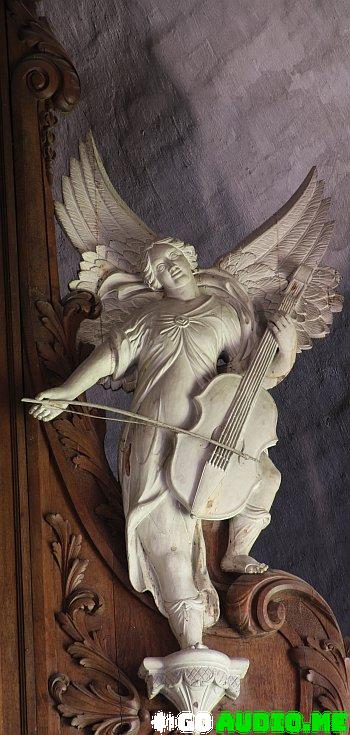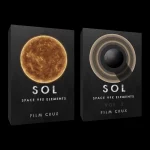Sonus Paradisi Leens Hinsz Organ VOL 2 (HAUPTWERK) Free Download

The organ in the Petruskerk in Leens was built 1733/34 by the Groningen organ builder Albertus Anthoni Hinsz (1704-1785), replacing an older instrument. The Hinsz organ has 27 stops and three divisions: Hoofdwerk, Rugwerk and Pedaal, and was completed in December 1734. Hinsz borrowed the design of the instrument from the organ of the Michaël church in Zwolle. The Leens organ is distinguished for its brilliant sound, compared to other Hinsz instruments, such as Midwolda or Harlingen. It is therefore closest to the Schnitger tradition in terms of sound. The richly decorated organ case, the carvings, and the sculptures were made by Theodorus van der Haven and Caspar Struiwigh. The organ is unusually large for a small church.
The organ was renovated in 1843/44 by Geert Pieters Dik, then in 1867 it was repaired by Petrus van Oeckelen after the construction of the new tower of the church, and in 1922 it was restored by Jan Doornbos. In each case, one or more stops were replaced. The 1922 restoration also included renewal of the façade pipes and wind supply. The Petruskerk itself was restored in 1948-52. The organ, which had been encased for protection during the church restoration, was made playable again by the organ maker Mense Ruiter. But at that time it became immediately apparent that the precious instrument had suffered to such an extent that a total restoration was necessary. This was carried out in the years 1963-67 by the organ builders Gebr. Van Vulpen in Utrecht. At that time, the original disposition was restored. The restored instrument was inaugurated on April 26, 1968. Over the years there were some corrections to this restoration, such as lowering the wind pressure (which is now 68mm). In 1981, there was a pedal coupler added. In 2010, the temperament was changed to a Neidhardt II (“Dorf”).
In 2019, a major maintenance was entrusted to Orgelmakerij Reil B.V. This included a reconstruction of the entire wind supply with five wedge bellows, as well as retouching other organ parts, including the Calcanten bell. The front pipes of the three Prestanten from 1922 were revoiced to better match the rest of the instrument, and the voicing of the rest of the pipework was corrected where necessary. The composition of the Scherp from 1968 was revised. However, the Neidhardt II tuning was maintained and the wind pressure remained almost the same. While the wind chests and pipework were in the workshop in Heerde in 2020, the carvings were restored and completed by Tico Top. Members of the Foundation Hinszorgel Leens then waxed the organ case and accessories, including the organ balustrade. In early May 2021, the restored organ was festively inaugurated.
Sonus Paradisi has recorded the organ twice: In the year 2017, before the Reil restoration, and in 2022 after the restoration. The mic positions and recording technique were the same for the main channels, and therefore it is possible to directly compare the sound before and after the restoration using a special ODF supplied with the sample set. This ODF gives the user the ability to switch back and forth between the two sounds of the instrument in real time. This capability shows the unique potential of the sampling technique for organ research and historiography; such a direct comparison is impossible otherwise, especially not in the real world with the real pipes.
Homepage:-https://www.sonusparadisi.cz/en/organs/netherlands/leens-hinsz-organ.html




![Sean Divine Vocal Chains SR v1.8 [UPDATED]](https://www.goaudio.net/wp-content/uploads/2025/10/Divine-Mixing-Vocal-Chains-SR-Updated-Box-Render-150x150.webp)



![Toontrack LATEST MIDI PACK [APRIL 2025]](https://www.goaudio.net/wp-content/uploads/2025/04/Toontrack-LATEST-MIDI-PACK-APRIL-2025-150x150.png?v=1745120673)
![Toontrack LATEST MIDI PACK [MARCH 2025]](https://www.goaudio.net/wp-content/uploads/2025/03/Toontrack-LATEST-MIDI-PACK-MARCH-2025-150x150.png?v=1743055485)

![Toontrack NEW RELEASED MIDI [FEB 2025]](https://www.goaudio.net/wp-content/uploads/2025/02/gandr-collage-3-150x150.jpg?v=1740710859)

![Toontrack LATEST RELEASES MIDI BUNDLE [DEC 2025]](https://www.goaudio.net/wp-content/uploads/2024/12/toontrck-2024-150x150.png?v=1733532112)




![Toontrack Hollowbody EBX [WIN+MAC]](https://www.goaudio.net/wp-content/uploads/2024/09/Toontrack-Hollowbody-EBX-150x150.png?v=1726103695)
![Toontrack LATEST RELEASES MIDI BUNDLE [SEP 2024]](https://www.goaudio.net/wp-content/uploads/2024/09/gandr-collage-11-150x150.jpg?v=1725764744)
![Blockbuster Sound Sand Dune & Mockingbird [BUNDLE]](https://www.goaudio.net/wp-content/uploads/2024/08/blockbuster-sound--150x150.png?v=1724378090)
![Blockbuster Sound Mermaids Sirens & Horror Pack [BUNDLE]](https://www.goaudio.net/wp-content/uploads/2024/08/Blockbuster-Sound-150x150.png?v=1723854097)







![Initial Audio XO – Heat Up 3 Expansion [WIN+MAC]](https://www.goaudio.net/wp-content/uploads/2022/10/XO-–-Heat-Up-3-Expansion--150x150.png?v=1666064730)


